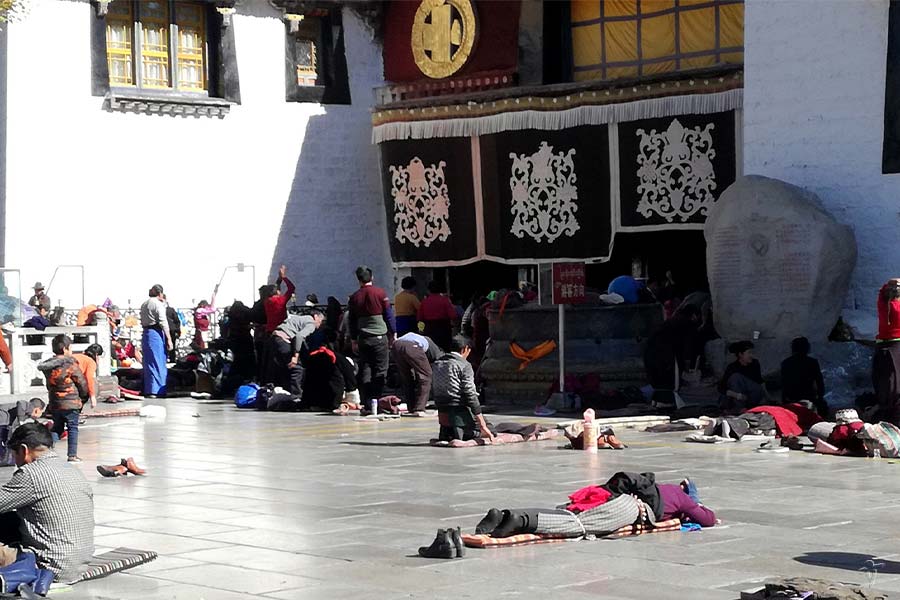Tibet Festivals

Tibet, inhabited by a group of devout Tibetan Buddhism believers, is a mysterious holy plateau appeal to many travelers where you can easily find breathtaking highland sceneries as well as the unique ethnic group with their distinctive culture. Tibetan people celebrate a number of traditional festivals, during the time pilgrims often flock toTibetwhere takes on strong party atmosphere with colorful activities and interesting things. If it is possible, try to plan yourTibettours with one of these festivals, and it will be one of your most memorable experiences in your life.
Below is a table list of the major traditional Tibetan festivals for your reference, and the ones in bold and blue are the most important known to people. Just keep in mind that the dates of all listed festivals are Tibetan calendar, which lags approximately four to six weeks behind solar calendar, for instance, the Tibetan January often falls in solar February, while the Tibetan May should be solar June or early July.
|
Date (Tibetan Calendar) |
Festival |
Location |
Activities & Practice |
|
1st-15th, January |
Tibetan New Year (Losar) |
Tibet, Jokhang Monastery |
Two-week-long celebrations with drama and carnivals, horse races and archery; family reunite, eat guthuk, expel evil spirits, make chema. |
|
4th-25th, January |
Monlam Prayer Festival |
Jokhang Monastery |
Also the Great Prayer Festival, a tradition begun by Tsong Khapa. Many pilgrims gather at Jokhang inLhasa, chanting prayers and performing religious rituals. |
|
15th, January |
Chunga Choepa (Butter Lamp Festival) |
Jokhang Monastery,Barkhor Street |
Commemorates Buddha's miracle at Sravasti. A similar Lantern Festival to Han Nationality; monks and folk artists make butter sculptures in diversified patterns and color, and put them on lamp holders inBarkhor Street. |
|
7th, April |
Pilgrim Festival |
|
Important month for pilgrims- the birth of Buddha Sakyamuni. |
|
15th, April |
Saka Dawa |
Lhasa, Jokhang Monastery,Dragon King Pond Square |
Celebrates the birth and Enlightenment of Sakyamuni and his entry to Nirvana. Worshippers flock to Jokhang inLhasato pray. Outdoor operas and release captured animals. |
|
5th, May |
Incense Festival |
|
On this day ghosts are said to prowl. Tibetans dress up and party to drive away the spirits. |
|
14th-16th, May |
Buddha Unfolding Festival (Hanging of the Thangka) |
Tashilhunpo Monastery, Shigatse |
A tradition lasted for 500 years, giant Thangkas of Amitayus, Sakyamuni and Maitreya are displayed on the Thangka Wall successively in Tashilhunpo Monastery; pilgrims flock to the monastery to pay offerings and accumulate their merits. |
|
4th, June |
Choekhor Duechcen Festival
|
Monasteries and holy mountains |
Also known as Paying Homage to Holy Mountain Festival, the feast is to commemorate Sakyamuni's first sermon; pilgrims go to monasteries to pay homage to the Buddha, and circumambulate around holy mountains. |
|
1st – 7th, July |
Sho Dun Festival |
Lhasa, Drepung Monastery, Norbulingka, Sera Monastery |
Literally Yoghurt Festiva, worship of the Buddha, picnics and Tibetan operas in theparkofNorbulingka, bonfires at night. |
|
6th-12th, July |
Washing Festival |
Lhasa rivers |
Lasts about a week. Tibetans believe the waters ofLhasarivers are the holiest during this period when Venus appears in the sky. They bring food and set up tents along rivers. They wash themselves and their clothes in the river and believe the holy water can cure any sickness and get rid of misfortune. |
|
July & August |
Golden Star Festival |
|
To wash away sins, such as passion, greed, jealousy and to abandon ego. Ritual bathing in rivers takes place and picnics are held. |
|
1st, August |
Nakchu Horse Racing Festival |
Nakchu |
People dress up, flock to Nakchu to create a colorful tent city. Exciting horse racing, archery, horsemanship, weightlifting, tug-of-war, and commodity fairs. Recreational activities are Tibetan circle dance, Tibetan cards, bonfire party and opera of Gesar. |
|
At the beginning of August |
Dajyur Festival |
Southern Tibet, Gyantse |
Last about 10 days, contests such as horse racing, bicycle riding, and rock-carrying. |
|
End of July or beginning of August |
Ongkar (Bumper Harvest) Festival |
Surrounding farmlands |
Occurs 2-3 days before the harvest in the riverine areas, it is celebrated annually by Tibetan farmers who walking around farmlands to pray for harvest of crops. Activities include singing and dancing, Tibetan opera, contests of horse racing, archery, stone holding and wrestling. |
|
22nd, September |
Buddha's descent |
Jokhang Monastery, Ramoche Monastery,PotalaPalace |
To commemorate Buddha's descent from heaven after preaching to his mother. All monasteries are opened and pilgrims gather to pray for good harvest and happiness. |
|
25th, October |
Tsong Khapa Butter Lamp Festival |
|
To memorize the passing away of Tsong Khapa, a great Buddhist and religious reformer of Geluk– myriads of butter lamp are lit on roofs, religious rites in monasteries. |
|
1st-7th, December |
New Year Festival |
Shigatse |
New Year Festival in Shigatse. |
|
29th, December |
Banishing Evil Spirits |
Tibet |
"Devil Dance" to drive out all evil from the Old Year to prepare for New Year. |




